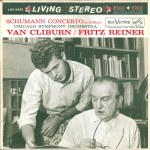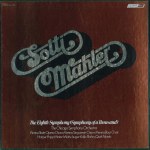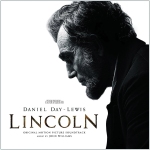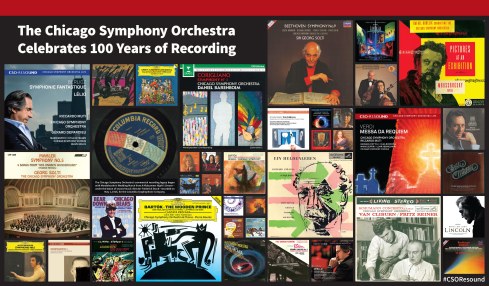 The commercial recording legacy of the Chicago Symphony Orchestra—under second music director Frederick Stock—began on May 1, 1916. For the Columbia Graphophone Company (at an undocumented location in Chicago), they recorded Mendelssohn’s Wedding March from A Midsummer Night’s Dream; Wagner’s Ride of the Valkyries from Die Walküre; and Grieg’s Two Elegiac Melodies, Heart Wounds and The Last Spring.
The commercial recording legacy of the Chicago Symphony Orchestra—under second music director Frederick Stock—began on May 1, 1916. For the Columbia Graphophone Company (at an undocumented location in Chicago), they recorded Mendelssohn’s Wedding March from A Midsummer Night’s Dream; Wagner’s Ride of the Valkyries from Die Walküre; and Grieg’s Two Elegiac Melodies, Heart Wounds and The Last Spring.
Mendelssohn’s Wedding March and Grieg’s The Last Spring were each on the first 80-rpm disc issued in October 1916, and a Columbia Records sales brochure raved, “The deepest glories vibrant in such a familiar composition as Mendelssohn’s Wedding March are unguessed until interpreted by such an orchestra as this. From the first trumpet fanfare to the great central crescendo is very joy and glory articulate! . . . There can be no pleasure beyond enjoying such music as the Chicago Symphony here brings to every music-loving home.”
To commemorate this legacy, this collage of record and CD labels is on display in the first floor of Symphony Center’s Rotunda through the end of the Orchestra’s current—the 125th—season. Details of all of the recordings included are below (all recordings were made at Orchestra Hall unless otherwise noted).
Austrian pianist Artur Schnabel made his debut with the Orchestra at the Ravinia Festival on July 11, 1942, performing Beethoven’s Fourth Piano Concerto with George Szell conducting. On July 22 and 24, Schnabel and the Orchestra recorded the Fourth along with Beethoven’s Fifth Piano Concerto at Orchestra Hall for Victor Records. Frederick Stock conducted these, his last, recording sessions with the Orchestra; he died a few short months later on October 20.

 The Chicago Symphony Orchestra gave the U.S. premiere of Prokofiev’s Scythian Suite under the baton of the composer on December 6, 1918. On March 16, 1945, third music director Désiré Defauw recorded the work for RCA.
The Chicago Symphony Orchestra gave the U.S. premiere of Prokofiev’s Scythian Suite under the baton of the composer on December 6, 1918. On March 16, 1945, third music director Désiré Defauw recorded the work for RCA.
Fourth music director Artur Rodzinski led the Orchestra in a complete performance of Wagner’s Tristan and Isolde—with Set Svanholm and Kirsten Flagstad in the title roles—at the Civic Opera House on November 16, 1947. A month later on December 14, he led the Orchestra in recording sessions for the Prelude and Liebestod at Orchestra Hall.

 For Mercury Records, fifth music director Rafael Kubelík led the Orchestra’s first recording of Ravel’s orchestration of Mussorgsky’s Pictures at an Exhibition on April 23 and 24, 1951. Principal trumpet Adolph Herseth performed the opening fanfare.
For Mercury Records, fifth music director Rafael Kubelík led the Orchestra’s first recording of Ravel’s orchestration of Mussorgsky’s Pictures at an Exhibition on April 23 and 24, 1951. Principal trumpet Adolph Herseth performed the opening fanfare.
On March 6, 1954, sixth music director Fritz Reiner and the Orchestra recorded together for the first time: Strauss’s Dance of the Seven Veils from Salome and Ein Heldenleben for RCA. (Reiner’s complete CSO catalog recently was re-released by RCA.)

 At the third annual Grammy awards ceremony on April 12, 1961, the Orchestra’s recording of Bartók’s Music for Strings, Percussion, and Celesta received the award for Best Classical Performance–Orchestra. Reiner had conducted the RCA release. That same evening, the Orchestra’s recording of Brahms’s Second Piano Concerto—also on RCA and with Erich Leinsdorf conducting—earned the award for Best Classical Performance–Concerto or Instrumental Soloist for Sviatoslav Richter. These were the first two Grammy awards earned for recordings by the Chicago Symphony Orchestra.
At the third annual Grammy awards ceremony on April 12, 1961, the Orchestra’s recording of Bartók’s Music for Strings, Percussion, and Celesta received the award for Best Classical Performance–Orchestra. Reiner had conducted the RCA release. That same evening, the Orchestra’s recording of Brahms’s Second Piano Concerto—also on RCA and with Erich Leinsdorf conducting—earned the award for Best Classical Performance–Concerto or Instrumental Soloist for Sviatoslav Richter. These were the first two Grammy awards earned for recordings by the Chicago Symphony Orchestra.

 Reiner led the Orchestra, Chicago Symphony Chorus (prepared by its founder Margaret Hillis), and mezzo-soprano Rosalind Elias in Prokofiev’s Alexander Nevsky for RCA—the first recording collaboration with the Orchestra and the Chorus—on March 7, 1959, at Orchestra Hall.
Reiner led the Orchestra, Chicago Symphony Chorus (prepared by its founder Margaret Hillis), and mezzo-soprano Rosalind Elias in Prokofiev’s Alexander Nevsky for RCA—the first recording collaboration with the Orchestra and the Chorus—on March 7, 1959, at Orchestra Hall.
Two years after winning the prestigious 1958 Tchaikovsky Competition in Moscow, Van Cliburn made his first recording with the Orchestra on April 16, 1960: Schumann’s Piano Concerto with Reiner conducting for RCA. (A complete list of Cliburn’s appearances and recordings with the Chicago Symphony Orchestra can be found here.)
 On March 19, 1966, seventh music director Jean Martinon led the Orchestra in recording sessions for Martin’s Concerto for Seven Wind Instruments, Timpani, Percussion, and String Orchestra for RCA. Featured soloists were CSO principals Clark Brody (clarinet), Willard Elliot (bassoon), Donald Peck (flute), Dale Clevenger (horn, in his first week on the job), Ray Still (oboe), Adolph Herseth (trumpet), Donald Koss (timpani), and Jay Friedman (trombone). (Martinon’s complete CSO catalog recently was re-released by RCA.)
On March 19, 1966, seventh music director Jean Martinon led the Orchestra in recording sessions for Martin’s Concerto for Seven Wind Instruments, Timpani, Percussion, and String Orchestra for RCA. Featured soloists were CSO principals Clark Brody (clarinet), Willard Elliot (bassoon), Donald Peck (flute), Dale Clevenger (horn, in his first week on the job), Ray Still (oboe), Adolph Herseth (trumpet), Donald Koss (timpani), and Jay Friedman (trombone). (Martinon’s complete CSO catalog recently was re-released by RCA.)

 Benny Goodman recorded Nielsen’s Clarinet Concerto with the Orchestra on June 18, 1966, for RCA. Morton Gould conducted. (Gould’s complete CSO catalog recently was re-released by RCA.)
Benny Goodman recorded Nielsen’s Clarinet Concerto with the Orchestra on June 18, 1966, for RCA. Morton Gould conducted. (Gould’s complete CSO catalog recently was re-released by RCA.)
At Medinah Temple on February 20 and 21, 1968, Leopold Stokowski and the Orchestra recorded Shostakovich’s Symphony no. 6 for RCA.

 Carlo Maria Giulini—the Chicago Symphony Orchestra’s first principal guest conductor—recorded selections from Berlioz’s Romeo and Juliet for Angel on October 13 and 14, 1969, at Medinah Temple.
Carlo Maria Giulini—the Chicago Symphony Orchestra’s first principal guest conductor—recorded selections from Berlioz’s Romeo and Juliet for Angel on October 13 and 14, 1969, at Medinah Temple.
The Orchestra made its second recording of Rimsky-Korsakov’s Sheherazade on June 30 and July 1, 1969, at Medinah Temple for Angel. Seiji Ozawa, the Ravinia Festival’s first music director, conducted and concertmaster Victor Aitay was violin soloist.

 During eighth music director Georg Solti‘s first season as music director, the Orchestra performed Mahler’s Fifth Symphony at Carnegie Hall on January 9, 1970, and were called back for twelve curtain calls. Beginning on March 26 at Medinah Temple, Solti and the Orchestra committed their performance to disc—their first recording together—for London Records.
During eighth music director Georg Solti‘s first season as music director, the Orchestra performed Mahler’s Fifth Symphony at Carnegie Hall on January 9, 1970, and were called back for twelve curtain calls. Beginning on March 26 at Medinah Temple, Solti and the Orchestra committed their performance to disc—their first recording together—for London Records.
Daniel Barenboim, who would later become ninth music director, made his first recording with the Orchestra on November 11, 1970, at Medinah Temple. For Angel, he led sessions for Dvořák’s Cello Concerto with his wife Jacqueline du Pré as soloist. (A summary of du Pré’s association with the Orchestra is here.)
 Before the Chicago Symphony Orchestra performed the first concert of its first tour to Europe in 1971, Solti led recording sessions for Mahler’s Eighth Symphony at the Sofiensaal in Vienna on August 30, 31, and September 1. Soloists included Heather Harper, Lucia Popp (more about Popp’s performances with the Orchestra is here), Arleen Augér, Yvonne Minton, Helen Watts, René Kollo, John Shirley-Quirk, and Martti Talvela. The recording won three 1972 Grammy awards for Album of the Year–Classical, Best Choral Performance–Classical (other than opera) (for the Chorus of the Vienna State Opera, Singverein Chorus, and Vienna Boys’ Choir), and Best Engineered Recording–Classical.
Before the Chicago Symphony Orchestra performed the first concert of its first tour to Europe in 1971, Solti led recording sessions for Mahler’s Eighth Symphony at the Sofiensaal in Vienna on August 30, 31, and September 1. Soloists included Heather Harper, Lucia Popp (more about Popp’s performances with the Orchestra is here), Arleen Augér, Yvonne Minton, Helen Watts, René Kollo, John Shirley-Quirk, and Martti Talvela. The recording won three 1972 Grammy awards for Album of the Year–Classical, Best Choral Performance–Classical (other than opera) (for the Chorus of the Vienna State Opera, Singverein Chorus, and Vienna Boys’ Choir), and Best Engineered Recording–Classical.

 On December 13, 1977, Barenboim and the Orchestra recorded Bruckner’s Sixth Symphony for Deutsche Grammophon, part of a complete cycle of the composer’s symphonies that also included the Te Deum, Helgoland, and Psalm 150.
On December 13, 1977, Barenboim and the Orchestra recorded Bruckner’s Sixth Symphony for Deutsche Grammophon, part of a complete cycle of the composer’s symphonies that also included the Te Deum, Helgoland, and Psalm 150.
Following concerts in Orchestra Hall and Carnegie Hall, Solti led the Orchestra, Chorus, and soloists (including Hildegard Behrens as Leonore and Peter Hofmann as Florestan) and in recording sessions for Beethoven’s Fidelio—”the first digitally recorded opera to be released,” according to Gramophone—at Medinah Temple on May 21, 22, 23, and 24, 1979.

 Second music director of the Ravinia Festival, James Levine led the Orchestra, Chorus, Glen Ellyn Children’s Chorus, and soloists (June Anderson, Phillip Creech, and Bernd Weikl) in sessions for Orff’s Carmina burana on July 9 and 10, 1984, for Deutsche Grammophon. The recording was awarded the 1986 Grammy Award for Best Choral Performance (other than opera).
Second music director of the Ravinia Festival, James Levine led the Orchestra, Chorus, Glen Ellyn Children’s Chorus, and soloists (June Anderson, Phillip Creech, and Bernd Weikl) in sessions for Orff’s Carmina burana on July 9 and 10, 1984, for Deutsche Grammophon. The recording was awarded the 1986 Grammy Award for Best Choral Performance (other than opera).
At the end of a subscription concert at Orchestra Hall on January 23, 1986, Solti led the Orchestra and Chorus in a spirited encore of the Chicago Bears‘ fight song “Bear Down, Chicago Bears” in anticipation of the team’s Super Bowl victory. The day after the game, the work was recorded by London Records.

 Solti led recording sessions at Medinah Temple for Beethoven’s Ninth Symphony—the second time he and the Orchestra and Chorus had recorded the work—on September 28, 30, and October 7, 1986, for London. Soloists were Jessye Norman, Reinhild Runkel, Robert Schunk, and Hans Sotin. The release was awarded the 1987 Grammy Award for Best Orchestral Performance.
Solti led recording sessions at Medinah Temple for Beethoven’s Ninth Symphony—the second time he and the Orchestra and Chorus had recorded the work—on September 28, 30, and October 7, 1986, for London. Soloists were Jessye Norman, Reinhild Runkel, Robert Schunk, and Hans Sotin. The release was awarded the 1987 Grammy Award for Best Orchestral Performance.
Claudio Abbado, second principal guest conductor, led the Orchestra in Brahms’s Double Concerto with Isaac Stern and Yo-Yo Ma (future Judson and Joyce Green Creative Consultant) as soloists on November 7 and 8, 1986, for CBS Records.

 Closing the 97th season in June 1988, Leonard Bernstein led the Orchestra in performances of Shostakovich’s First and Seventh symphonies. Recorded live by Deutsche Grammophon, the release received the 1990 Grammy Award for Best Orchestral Performance.
Closing the 97th season in June 1988, Leonard Bernstein led the Orchestra in performances of Shostakovich’s First and Seventh symphonies. Recorded live by Deutsche Grammophon, the release received the 1990 Grammy Award for Best Orchestral Performance.
On March 15, 16, and 17, 1990, Barenboim led the world premiere performances of composer-in-residence John Corigliano’s Symphony no. 1, commissioned for the Orchestra. The live recording—Barenboim and the Orchestra’s first on the Erato label—was awarded two 1991 Grammy awards for Best Orchestral Performance and Best Contemporary Composition.

 The recording of Bartók’s The Wooden Prince and Cantata profana led by Pierre Boulez for Deutsche Grammophon—recorded on December 19, 20, and 21, 1991—was awarded four 1993 Grammy awards: Best Classical Album, Best Orchestral Performance, Best Performance of a Choral Work, and Best Engineered Recording–Classical. (A complete list of Boulez’s recordings with the Orchestra is here and his complete Grammy awards are here.)
The recording of Bartók’s The Wooden Prince and Cantata profana led by Pierre Boulez for Deutsche Grammophon—recorded on December 19, 20, and 21, 1991—was awarded four 1993 Grammy awards: Best Classical Album, Best Orchestral Performance, Best Performance of a Choral Work, and Best Engineered Recording–Classical. (A complete list of Boulez’s recordings with the Orchestra is here and his complete Grammy awards are here.)
Between 1993 and 1996, Levine led the Orchestra and Chorus in recording sessions at Medinah Temple for Disney‘s feature film Fantasia 2000. The movie was released on January 1, 2000.

 Shortly after being named the Orchestra’s third principal guest conductor, Boulez led sessions for Varèse’s Amériques, Arcana, Déserts, and Ionisation in December 1995 and 1996. The Deutsche Grammophon release was awarded the 2001 Grammy Award for Best Orchestral Performance.
Shortly after being named the Orchestra’s third principal guest conductor, Boulez led sessions for Varèse’s Amériques, Arcana, Déserts, and Ionisation in December 1995 and 1996. The Deutsche Grammophon release was awarded the 2001 Grammy Award for Best Orchestral Performance.
In May 1997 at Medinah Temple, the Orchestra recorded Falla’s Nights in the Gardens of Spain and The Three-Cornered Hat for Teldec. For Nights in the Gardens of Spain, Barenboim was piano soloist and Plácido Domingo conducted; for The Three-Cornered Hat, Jennifer Larmore was mezzo-soprano soloist and Barenboim conducted.

 A former Youth Auditions winner and member of the Civic Orchestra of Chicago, Rachel Barton recorded Brahms’s and Joachim’s violin concertos for Cedille Records on July 2 and 3, 2002. Carlos Kalmar conducted.
A former Youth Auditions winner and member of the Civic Orchestra of Chicago, Rachel Barton recorded Brahms’s and Joachim’s violin concertos for Cedille Records on July 2 and 3, 2002. Carlos Kalmar conducted.
In his first concerts as principal conductor on October 19, 20, and 21, 2006, Bernard Haitink led the Orchestra, women of the Chorus (prepared by Duain Wolfe), the Chicago Children’s Choir, and mezzo-soprano Michelle DeYoung in Mahler’s Third Symphony. The work is recorded as the inaugural release on CSO Resound.

 In May 2008, Haitink and the Orchestra recorded Shostakovich’s Fourth Symphony for CSO Resound. The release was awarded the 2008 Grammy Award for Best Orchestral Performance.
In May 2008, Haitink and the Orchestra recorded Shostakovich’s Fourth Symphony for CSO Resound. The release was awarded the 2008 Grammy Award for Best Orchestral Performance.
Boulez led the Orchestra in Stravinsky’s Pulcinella, Symphony in Three Movements, and Four Studies in February and March 2009 for CSO Resound. Soloists in the Pulcinella were Roxana Constantinescu, Nicholas Phan, and Kyle Ketelsen.

 On January 15, 16, and 17, 2009, Riccardo Muti—in his first concerts as music director designate—led the Orchestra, Chorus, and soloists (Barbara Frittoli, Olga Borodina, Mario Zeffiri, and Ildar Abdrazakov) in Verdi’s Requiem. The subsequent CSO Resound recording was awarded 2010 Grammy awards for Best Classical Album and Best Choral Performance.
On January 15, 16, and 17, 2009, Riccardo Muti—in his first concerts as music director designate—led the Orchestra, Chorus, and soloists (Barbara Frittoli, Olga Borodina, Mario Zeffiri, and Ildar Abdrazakov) in Verdi’s Requiem. The subsequent CSO Resound recording was awarded 2010 Grammy awards for Best Classical Album and Best Choral Performance.
Following his first concert as the Chicago Symphony Orchestra’s tenth music director (for more than 25,000 people in Millennium Park) in September 2010, Muti led the Orchestra, Chorus, and soloists (Gérard Depardieu, Mario Zeffiri, and Kyle Ketelsen) in Berlioz’s Symphonie fantastique and Lélio. The two-disc set was released on CSO Resound in September 2015.

 On April 7, 9, and 12, 2011, Muti led concert performances—recorded by CSO Resound—of Verdi’s Otello at Orchestra Hall. Along with the Orchestra, Chorus, and Chicago Children’s Chorus, soloists included Aleksandrs Antonenko in the title role, Krassimira Stoyanova as Desdemona, and Carlo Guelfi as Iago.
On April 7, 9, and 12, 2011, Muti led concert performances—recorded by CSO Resound—of Verdi’s Otello at Orchestra Hall. Along with the Orchestra, Chorus, and Chicago Children’s Chorus, soloists included Aleksandrs Antonenko in the title role, Krassimira Stoyanova as Desdemona, and Carlo Guelfi as Iago.
In February 2012, Muti led world premieres by the Orchestra’s Mead Composers-in-Residence: Anna Clyne’s Night Ferry and Mason Bates’s Alternative Energy. Both works were recorded for CSO Resound and released as digital downloads.
 For Sony Classical, composer John Williams led the Orchestra and Chorus in recording sessions at Orchestra Hall for his soundtrack for the motion picture Lincoln. Director Steven Spielberg was on hand to supervise.
For Sony Classical, composer John Williams led the Orchestra and Chorus in recording sessions at Orchestra Hall for his soundtrack for the motion picture Lincoln. Director Steven Spielberg was on hand to supervise.
Cheers to the next 100!



5 comments
Comments feed for this article
May 1, 2021 at 9:27 AM
The Chicago Symphony Orchestra’s first recordings | from the archives
[…] article also appears here. Portions of this article previously appeared here and […]
September 13, 2018 at 1:05 PM
William C Sheldon MD
Could you ever “resound” the recording of the Brahms German Requiem of March 2, 1950 with Bruno Walter, the Combined Northwestern Choirs, Nancy Carr and Bruce Foote?
William Sheldon
September 13, 2018 at 1:12 PM
Frank Villella
Dear William – Thank you for your inquiry, but, unfortunately, we do not hold the radio broadcast master of that performance.
January 3, 2017 at 9:19 AM
Remembering Theodore Thomas | from the archives
[…] In May 2016, the Chicago Symphony Orchestra celebrated 100 years of recording. […]
September 27, 2016 at 9:09 AM
125 Moments: 118 First Recording | from the archives
[…] This article also appears here and portions previously appeared here. […]